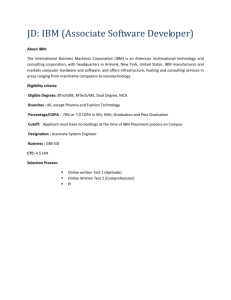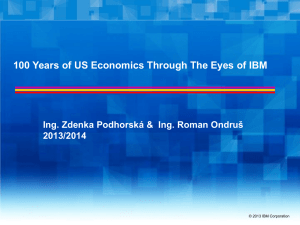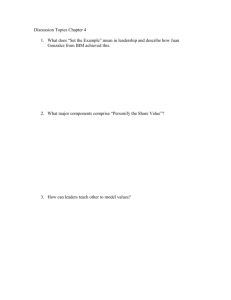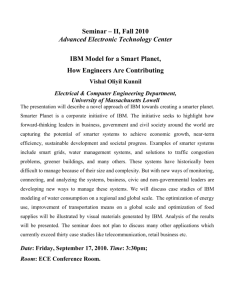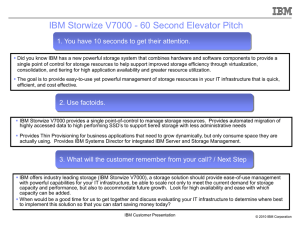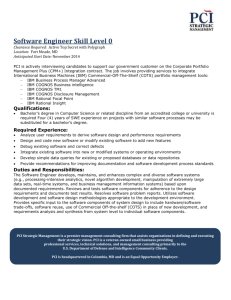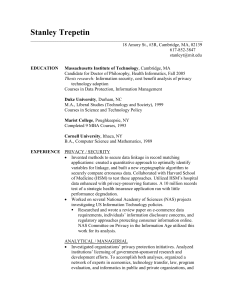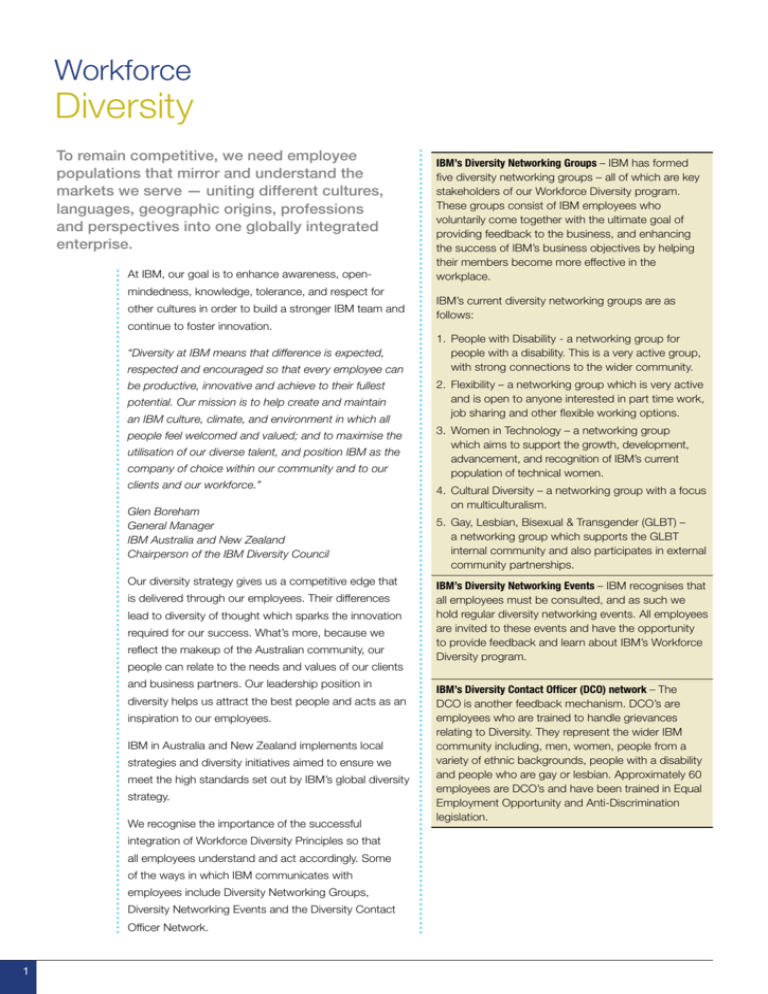
Workforce
Diversity
To remain competitive, we need employee
populations that mirror and understand the
markets we serve — uniting different cultures,
languages, geographic origins, professions
and perspectives into one globally integrated
enterprise.
At IBM, our goal is to enhance awareness, openmindedness, knowledge, tolerance, and respect for
other cultures in order to build a stronger IBM team and
continue to foster innovation.
“Diversity at IBM means that difference is expected,
respected and encouraged so that every employee can
be productive, innovative and achieve to their fullest
potential. Our mission is to help create and maintain
an IBM culture, climate, and environment in which all
people feel welcomed and valued; and to maximise the
utilisation of our diverse talent, and position IBM as the
company of choice within our community and to our
clients and our workforce.”
Glen Boreham
General Manager
IBM Australia and New Zealand
Chairperson of the IBM Diversity Council
Our diversity strategy gives us a competitive edge that
is delivered through our employees. Their differences
lead to diversity of thought which sparks the innovation
required for our success. What’s more, because we
reflect the makeup of the Australian community, our
people can relate to the needs and values of our clients
and business partners. Our leadership position in
diversity helps us attract the best people and acts as an
inspiration to our employees.
IBM in Australia and New Zealand implements local
strategies and diversity initiatives aimed to ensure we
meet the high standards set out by IBM’s global diversity
strategy.
We recognise the importance of the successful
integration of Workforce Diversity Principles so that
all employees understand and act accordingly. Some
of the ways in which IBM communicates with
employees include Diversity Networking Groups,
Diversity Networking Events and the Diversity Contact
Officer Network.
1
IBM’s Diversity Networking Groups – IBM has formed
five diversity networking groups – all of which are key
stakeholders of our Workforce Diversity program.
These groups consist of IBM employees who
voluntarily come together with the ultimate goal of
providing feedback to the business, and enhancing
the success of IBM’s business objectives by helping
their members become more effective in the
workplace.
IBM’s current diversity networking groups are as
follows:
1.People with Disability - a networking group for
people with a disability. This is a very active group,
with strong connections to the wider community.
2.Flexibility – a networking group which is very active
and is open to anyone interested in part time work,
job sharing and other flexible working options.
3.Women in Technology – a networking group
which aims to support the growth, development,
advancement, and recognition of IBM’s current
population of technical women.
4.Cultural Diversity – a networking group with a focus
on multiculturalism.
5.Gay, Lesbian, Bisexual & Transgender (GLBT) –
a networking group which supports the GLBT
internal community and also participates in external
community partnerships.
IBM’s Diversity Networking Events – IBM recognises that
all employees must be consulted, and as such we
hold regular diversity networking events. All employees
are invited to these events and have the opportunity
to provide feedback and learn about IBM’s Workforce
Diversity program.
IBM’s Diversity Contact Officer (DCO) network – The
DCO is another feedback mechanism. DCO’s are
employees who are trained to handle grievances
relating to Diversity. They represent the wider IBM
community including, men, women, people from a
variety of ethnic backgrounds, people with a disability
and people who are gay or lesbian. Approximately 60
employees are DCO’s and have been trained in Equal
Employment Opportunity and Anti-Discrimination
legislation.
The Journey Ahead
represented 31% of all promotions into first line
Workforce Diversity = Diversity of thought = Innovation
management, 22% into second line management, and
17% into third line management.
Areas of Focus in 2007
1. Women in the Workforce
In 2007, IBM was named an Employer of Choice for
2. People with Disability
Women by the Equal Opportunity for Women in the
3. Work Life Integration
Workplace Agency. This is the seventh year in a row
4. Gay, Lesbian, Bisexual and Transgender (GLBT)
that IBM Australia has been awarded the citation for
5. Cultural Diversity
creating a work culture that supports the advancement
6. Generational Diversity
of women. Also in 2007, IBM was named a finalist at the
annual Equal Opportunity for Women in the Workplace
Women in the Workforce
Agency’s (EOWA) Business Achievement Awards.
Globally, IBM has seen substantial growth in the
Attracting Women
number of senior women executives — from 185 in
In 2007, 30% of IBM’s graduate hires were women,
1997 to more than 1,000 today. Sixty-five percent of
more than double the current rate of females entering
our women executives are working mothers; and we
tertiary IT courses. We have a comprehensive long-term
have 16 female country managers in locations such as
strategy designed not only to attract female graduates
Singapore, Taiwan, Thailand, and Spain. Each of these
to the company, but to encourage women in Australia
women demonstrates outstanding leadership qualities
and New Zealand to enter IT studies and careers.
and is achieving superior business results. All IBM had
to do was level the playing field so that excellence and
achievement were the only criteria for success.
Women in the Workforce Programs and Achievements
Our Performance in Australia
Metric
2004
2005
2006
2007
Hiring
24%
27%
27%
30%
Women in Technical Roles
24%
24%
24%
37%
Women in Management
25%
28%
28%
27%
Women Executives
16%
17%
18%
18%
In 2007, women made up 31% of IBM Australia’s
workforce, and we are still very much committed to
recruiting, retaining and promoting the best female talent
available.
Also in 2007, we saw an increase in the overall number
of women hired by IBM, and the number of women in
technical roles. From 2004 through to September 2007,
the percentage of women on IBM’s Technical Resources
High Potential Program also increased from 15.0% to
19.0%. Women currently make up 92% of the overall
part time workforce at IBM, with 39% of women who
are working part time in senior roles.
Advancing Women
By year end 2007, 18% of IBM’s executives were
female, demonstrating a steady year on year increase
since 2004 (when the figure was at 9.4%). Women
2
School Speakers Program – The School Speakers
Program was developed in 2000 in partnership
with Swinburne University in Melbourne, Victoria.
In 2002 the program was extended into NSW with
the University of Technology, Sydney. The program
consists of teams of volunteer female IBM employees
and university students visiting schools to demystify
study and career opportunities in IT and engineering.
Over 1500 school children in 17 schools had the
benefit of a visit from 13 registered IBM volunteers.
Serious Women’s Business Conference – In 2007, IBM
who is a foundation partner, participated in a Serious
Women’s Business Conference that focused on
‘Defining Success’. IBM’s Executive Sponsor for
Women was the Chairperson at the conference, and
IBM had over 100 employees attend, with feedback
about the conference being very positive. Attendees
found value in not only the content but also the
opportunity to network with over women. It was an
ideal opportunity for IBM women to reflect on their
own definition of success and to gain insight to what
other women are doing that is inspirational.
EX.I.T.E. Camps – IBM’s EX.I.T.E. (EXploring Interests
in Technology and Engineering) camps are inspiring
middle-school girls to make a difference through
science and technology. IBM runs the program in
collaboration with Local High Schools and the Public
Education Office. We held three EX.I.T.E. camps in
2007 in Ballarat, Sydney and Brisbane, with over 60
girls participating.
AWISE (Australian Women in IT and Science Entity)
Partnership – In 2007, IBM continued their partnership
with AWISE to reach out to young girls about IT as
a career. Through this partnership IBM has been
involved in the:
• Girls in ICT, Science, Mathematics and Technology
Conference
• National – Go For IT Girl IT Blueprint
• Board Readiness Program in South Australia
• Mentoring Program in NSW
• Various Networking events across Australia
• Tech Girls are Chic not just Geek book launch
• Tech2Morrow
service providers to develop live ‘on-demand’ services.
IBM’s strategy continues to focus on developing
innovative pathways for people with disability to enter
ICT education and careers. These initiatives aim
to increase the number of people with disability in
employment and add to the potential IBM talent pool.
Increasing the pipeline
In Australia, IBM knows the strategic importance of
collaboration and is committed to partnerships with
Government, Education and the Community, to build the
Ongoing initiatives
number of people with disability to enter into education
• Career Development web lectures for women
and employment in the ICT Industry. Some recent and
• Waite Group Top Steps program for women
ongoing Programs include:
• Taking the Stage influencing workshop for women
• Springboard early career development program
for women
• Mindset workshops for managers on the value
that women bring to IBM
• Annual salary equity reviews by gender to remove
possible bias
• Chief Executive Women Talent Development
program
People with Disability
Our Performance
Our long term commitment and approach to ensuring
that people with disability are represented in our
business has resulted in workforce representation
across all business areas in the organisation and at
all levels.
This fact was externally recognised in 2007 when IBM
was named a finalist in the Prime Minister’s Employer of
the Year award for the inclusion of people with disability.
IBM was recognised for its ongoing commitment
to disability employment through its proactive and
holistic approach, resulting in disability representation
throughout all business units and at all levels from
graduate to senior roles within the organisation.
In addition, IBM also won the Australian Sign
Language Interpreters Association (ASLIA) NSW
‘Organisation of the Year’ award for its commitment
to the deaf community in its workforce. IBM provides
accessible equipment and ongoing services, such as
interpreting services to employees through a central
accommodation fund. IBM has also partnered with
3
suppliers such as Australian interpreting and captioning
Willing and Able Mentoring (WAM) Program – IBM has
been involved in the Willing and Able Mentoring
Program initiated by Deakin University since its
inception in 2001, and supported the program to go
national in 2003. In 2007, when the program did not
gain federal funding, IBM stepped in with both the
Australian Employers Network on Disability and some
other key leading organisations, to support a relaunch of a national program so that all students with
a disability across Australia could have the opportunity
to participate and help launch their professional
careers. Over 60 IBM employees have volunteered to
participate in the program as a mentor.
School Speakers Program – The School Speakers
Program is aimed at de-mystifying IT for high school
students and is a collaboration between Industry and
Education to try to promote the significant benefits of
a career in IT. In 2004, IBM expanded this program
which was originally aimed at getting more women
into IT, to also aim at students with a disability. The
program is designed to encourage high school
students to follow IT education pathways by showing
the students about the wide and infinite possibilities
that a career in IT can bring. The program did this
through introducing them to young IBM graduates
and University IT students who spoke to them about
their own pathways and experiences.
EX.I.T.E. – IBM’s EX.I.T.E. (EXploring Interests in
Technology and Engineering) camps are another
initiative aimed at tackling the IT skills shortage, and
build a healthy pipeline of young people entering the
Industry. The camp was originally designed to develop
the skills and motivation of young women into IT, but
was adapted back in 2005 into a camp for young
students with a disability. The camps range in duration
from 3 to 5 days and are developed in partnership
with State Departments of Education across Australia,
to build the confidence and skills of students with
disability by developing their skills in IT in a fun and
hands on project based manner.
Work Life Integration
IBM aims to retain talented people by recognising the
importance of and supporting their life outside of work.
Our Performance
In 2007, over 75% of employees felt that working at
home and flexibility had a positive impact on work
productivity, morale and commitment. In addition,
IBM saw a 7% increase of employees who felt their
managers were supporting them in managing work
and life.
Accessibility
IBM believes that the combination of technology and
innovation can empower human potential by making its
information technology widely available and accessible
without regard of user ability. IBM’s competitiveness
in the marketplace depends on satisfying its clients’
demands for products that meet the needs of all
potential clients, including people with disability.
IBM has a global corporate instruction that all our
products must include important accessibility features
and functions, so that products, tools, applications and
services, are either directly accessible or compatible
with assistive technology. This instruction also applies
internally where, in 2007, IBM continued to provide
accessible physical and virtual environments to all of
its employees. This is a holistic approach that includes
a real estate accessibility strategy, a centralised
reasonable accommodations strategy, to enable our
people to succeed, and a procurement strategy where
accessibility is a standard criteria built into all supplier
engagements.
Education and Awareness
In 2007, IBM continued to build greater awareness and
capability throughout the organisation via education.
IBM conducted specific disability employment education
sessions for employees, as well as recruitment specific
sessions for its workforce management teams. Auslan
(Australian Sign Language) in-house courses were also
conducted and available to all employees wishing to
learn basic sign language.
The IBM People with Disability Networking Group also
conducted awareness raising events across the country
in 2007, which focused on disability that is acquired
through life.
4
IBM continues to appreciate the challenges of managing
work and life effectively and continues to provide Flexible
Working Options for employees. IBM’s flexible working
options include, Part Time/Job Share, Individualised
Work Schedules, Compressed Work Weeks, Working
from Home and Telecommuting.
Work Life Programs and Achievements
WorkLife Essentials – In 2007, IBM continued to
run its WorkLife Essentials online portal, to assist
employees with finding resources to help them
manage their work and life. There were over 1200
hits to this portal in 2007.
Men@Work – In 2004, IBM extended its School
Speakers Program to include a disability component,
where IBM employees with a disability visit schools
to promote IT to students with a disability. The
program is now integrated into the overall School
Speakers Program package.
Managing Separation and Single Parenting Seminar –
This seminar was held in Melbourne for IBM
employees who were interested in learning more
about:
• the challenges of child upbringing;
• how to meet a partner;
• encouraging and developing the child/parent
relationship with the non-custodial parent;
• advice on Work/Life/Balance for the single parent;
• how to manage your finances; and
• managing separation.
Generational Diversity
IBM also partnered with the Diversity Council of Australia
Our Generational Diversity strategy is focused on
area of Mature Age Employment in Australia and New
enabling mature workers to continue to contribute to
Zealand. This research assessed the underlying issues
our business success. As our workforce ages, IBM
of recruitment and retention of Mature Age workers in
faces greater competition to attract new employees and
a restricted labour market. It also provided IBM with
retain existing ones. To address this challenge, we have
data on how Mature Age workers felt about current and
processes, tools and strategies to retain and maximise
future engagement of the labour market.
in 2007 to deploy ground breaking research in the
the careers of our mature aged workforce and recruit
from this talent pool.
In 2007, all IBM managers from Australia and New
Zealand attended a manager conference in Brisbane. At
this conference managers were provided the opportunity
to attend workshops on ‘Leading a Multi-Generational
Workforce’.
At these workshops, managers were introduced to
the concept of building an environment and culture
where the individual needs of employees are respected
in regards to stages in their life and careers. Robert
Critchley, a well known consultant and author of
Generational Workforces, conducted two workshops
in June 2007, followed up by a teleconference call for
managers in September of the same year.
In 2007, we continued to deploy the Generational
Workforce Strategy, including Global Webcasts to raise
awareness and capability of Mature Age Workers with
the opportunity for employees to provide feedback on
some of the challenges and opportunities on the topic of
Mature Aged workers.
5
Our Performance
Metric
2004
2005
2006
2007
Representation of
workforce over 45
29%
31%
34%
44%
Representation of
workforce over 65
0.18%
0.27%
0.2%
0.24%
% of part-time workers
over 45
21%
22%
22%
22%
% of part-time workers
over 65
0.4%
0.8%
1.0%
1.0%
Our Generational Diversity Program aims to provide a
flexible workplace culture which allows IBM employees
to enjoy:
• continued participation in the workforce without
age-related barriers;
• flexible work hours and responsibilities;
• a variety of work style options;
• greater lifestyle choices;
• continued learning and job satisfaction; and
• an ongoing connection to the IBM community.
Cultural Diversity
The Cape York Program
IBM is dedicated to driving cultural change through
secondments to support Indigenous communities in
innovative principles and policies, and is committed to
Cape York. In conjunction with Indigenous Enterprise
providing a workplace where employees feel welcomed
Partnerships, this program works with other Indigenous
and valued for who they are. IBM operates across
organisations to develop solutions and support
nine time zones in 170 countries, where more than
programs that foster self-sufficiency in the community.
IBM is working with Westpac to provide employee
70 languages are spoken. This diversity is one of our
greatest strengths – especially when we leverage it
Since 2006, through the support and sponsorship of
effectively, bringing the best talent and ideas together to
individual business units and the wider IBM, thirteen
employees have
solve our clients’ problems.
now taken
Cultural diversity in IBM Australia
part in this
IBM Australia is a melting pot of cultures that
secondment
contribute greatly to both our innovation and
program. They
understanding of our clients. In 2007, IBM focused on
have used
continuing to build awareness of cultural diversity in
their skills and
our workforce, and also on growing our workforces’
experience to help
capability to work effectively in a globally integrated
build opportunity,
environment.
education and
employment in these
Asian Employee Constituency Networking Group
remote Indigenous
IBM employees established a globally
communities. The
recognised Asian Constituency Networking
various projects and
Group in Australia, which aims to highlight
opportunities cover a
the value of our Asian talent in the
wide scope and include
organisation and build greater awareness
and understanding of the Asian culture.
Networking Events
In 2007, IBM held various diversity networking events
celebrating different cultures including large celebrations
for the Lunar New Year in early 2007 and for Diwali,
the Indian Cultural Festival of Lights held in November
each year. IBM also supported and sponsored two IBM
teams in the NSW Dragon Boat Racing Carnival, which
was made up of employees from many different cultural
backgrounds, and the teams were well supported by
fellow IBM employees and their families who were able to
enjoy the company provided BBQ’s.
development, IT and Marketing.
Shades of Blue
In 2007, IBM introduced a new version of its Cultural
Intelligence education, Shades of Blue. This blended
learning solutions and provided managers and
employees with awareness, knowledge and skill
readiness to work effectively across cultural differences
and within a multicultural environment. Participants
understand cultural competence and its importance to
our environment today through exploring key cultural
differences on national, functional, and interpersonal
EX.I.T.E. Camp for Indigenous Australian students
levels. Participants were also able to explore real-life
In 2007, IBM developed the first EX.I.T.E. (EXploring
challenges and opportunities to improve performance
Interests in Technology and Engineering) camp for
and bridge cultural gaps enabling employees to work
Indigenous students. It was held in Ballarat, Victoria at
successfully across cultures and across borders.
the IBM facility which is located close to the University
of Ballarat’s Mount Helen Campus. IBM, the University
of Ballarat and the Victorian Department of Education,
worked with the local Indigenous community to present
a four day camp for Indigenous students across the
region, to develop their skills and motivation for IT, in a
fun and project based camp environment.
6
areas such as income
management, business development, personal
Floating Cultural Holiday
To acknowledge individuals’ needs to balance cultural
and work commitments, our Floating Cultural Holiday
policy gives people the option of ‘trading’ official public
holidays for another day of personal cultural significance.
For example, an employee may wish to ‘trade’ the
Queen’s Birthday for Yom Kippur, Diwali or Eid.
Gay Lesbian Bisexual &
Transgender Diversity
IBM GLBT Employee Empowerment Conference
IBM strives to create an atmosphere where Gay Lesbian
March 2007, IBM held a GLBT Employee Empowerment
Bisexual & Transgender (GLBT) employees are valued,
Conference. The objective of the conference was:
empowered to think freely, express themselves and
to reinforce IBM’s commitment to supporting an
innovate, and able to fully contribute to the workplace
environment that is actively inclusive of GLBT
and our clients. Below are some of the recent initiatives
individuals; to challenge existing perspectives of GLBT
and ongoing activities delivered in 2007.
held within the workplace; to discuss and understand
GLBT Employee Networking Group
The ‘EAGLE’ (Employee Alliance for Gay & Lesbian
Empowerment) Networking Group consists of proactive
employees whose
“The employees of IBM
represent a talented
and diverse workforce.
Achieving the full potential
of this diversity is a business
priority that is fundamental
to our competitive success.
Business activities such
as hiring, promotion,
and compensation of
employees, are conducted
without regard to
gender, gender identity
or expression, sexual
orientation.”
Mark Latchford,
Vice President, IBM Sales and Distribution
Executive sponsor for GLBT employees
at IBM Australia
Workplace inclusion and engaged participation is
important from IBM’s and its employees’ perspective. In
issues; and to develop a focused set of actions that
further improve the reach and influence in addressing
GLBT issues within IBM, with external organisations and
business partners, and in support of the community.
objective is to work
Employee Float in the Sydney Mardi Gras
with the organisation
IBM proudly supports its GLBT employees in celebration
to promote a safe
of diversity and has been sponsoring a float in the
and open working
Sydney Mardi Gras since 2004. In 2007, over 80 IBM
environment for all
employees, partners and friends joined the float which
employees, regardless
aptly showcased IBM’s overall marketing theme of
of sexual orientation,
‘What Makes You Special?’
gender identity, or
gender expression.
The group offers
GLBT employees
opportunities to network
both professionally
and socially, career
development and
mentoring development,
The Midsumma Festival
In January 2007, IBM sponsored and participated in
the Volunteers Program of the Midsumma Festival. The
festival celebrated 20 years of diversity and inclusion
in the community and had over 100,000 people enjoy
the month long calendar of arts and cultural events,
showcasing the talents within GLBT community to the
wider community.
participation in
2008 Diversity Objectives
community outreach and
√ Ensure our workforce is representative of IBM’s client
input into developing
IBM’s overall GLBT
strategy. As with all of
the Diversity Networking
Groups, EAGLE has
a representative on the IBM Diversity Council and the
and community base.
√ Raise employee morale by being seen as an
employer of choice by our people.
√ Contribute to our brand image by being recognised
as a leader in diversity and as an employer of choice
in the external marketplace.
Global GLBT Taskforce as well as the regional Asia
Pacific internal GLBT work team.
© Copyright IBM Australia Limited 2008 ABN 79 000 024 733 © Copyright IBM Corporation 2008 All Rights Reserved.
7

